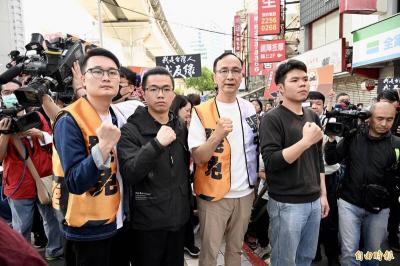President Ma Ying-jeou’s (馬英九) administration is completely ignoring the hostility China has displayed toward Taiwan and its ultimate purpose to bring Taiwan into its fold by offering immunity and privileges to a planned representative office for China’s Association for Relations Across the Taiwan Straits (ARATS) in Taiwan, Taiwan Solidarity Union (TSU) Chairman Huang Kun-huei (黃昆輝) said yesterday.
The move is tantamount to opening the door to Chinese spies and helping China take over Taiwan, he added.
The Cabinet on Thursday approved a draft bill governing the establishment of representative offices on both sides of the Taiwan Strait.
Under the bill, the ARATS branches in Taiwan and staff at the offices would be granted certain special rights to allow them to carry out their duties without legal interference.
Included in the special rights are provisions that no one can enter the branches without the permission of those offices; their property and assets would be immune from search, confiscation or expropriation; and documents and archives would be inviolable. The bill stipulates that Chinese staff at the ARATS offices in Taiwan would enjoy immunity from Taiwan’s jurisdiction in civil and criminal matters in the exercise of their duties, and would have certain tax exemptions and other privileges to be decided at the discretion of the Cabinet.
Huang, who formerly served as Mainland Affairs Council (MAC) minister, said that even the US, a close friend of Taiwan, does not give judicial immunity to Taiwanese diplomats, “and yet the Ma government is giving China such privileges, which could constitute a substantial threat to Taiwan’s national security.”
Huang questioned the use of setting up such offices, saying that as the Taiwan External Trade Development Council, as well as tourism agencies, already have offices in China, he saw no legitimate reason to set up another governmental office.
It is “international common knowledge” that Chinese embassy officials are tasked with multiple jobs, one of which is espionage, he said.
“It is surprising the Ma administration would allow such privileges to the Chinese despite this knowledge. The staff sent to Taiwan may attempt to gather sensitive information during their stay,” he said.
Taiwan is a country governed by the rule of law, but China is a country governed by the word of men, Huang said.
To give Chinese officials in Taiwan judicial immunity is to sanction illegal activities during their stay in Taiwan, Huang added, calling for the labor and financial sectors to be on the alert as the Chinese government often supports corporate espionage to steal intellectual property or corporate secrets.
Democratic Progressive Party Policy Research Committee Executive Director Joseph Wu (吳釗燮), who also once served as MAC minister, said that for such offices to be set up, three prerequisites must be met: first, the offices cannot evolve into the equivalent of the Liaison Office of the Central People’s Government in the Hong Kong Special Administrative Region; second, the office’s mandate must be clearly defined; third, the offices should adhere to international diplomatic regulations.
Taiwan does not need a platform for China’s “united front” (統戰) tactics, he said.

The Ministry of Economic Affairs has fined Taobao NT$1.2 million (US$36,900) for advertisements that exceeded its approved business scope and ordered the Chinese e-commerce platform to make corrections in the first half of this year or its license would be revoked. Lawmakers have called for stricter supervision of Chinese e-commerce platforms and more stringent measures to prevent China from laundering its goods through Taiwan as US President Donald Trump’s administration cracks down on origin laundering. The legislature’s Finance Committee yesterday met to discuss policies to prevent China from dumping goods in Taiwan, inviting government agencies to report on the matter. Democratic Progressive Party

Taiwan and its Pacific ally Tuvalu on Tuesday signed two accords aimed at facilitating bilateral cooperation on labor affairs, according to Taiwan’s Ministry of Foreign Affairs (MOFA). The governments inked two agreements in Taipei, witnessed by Foreign Minister Lin Chia-lung (林佳龍) and visiting Deputy Tuvaluan Prime Minister Panapasi Nelesone, MOFA said in a news release. According to MOFA, the agreements will facilitate cooperation on labor issues and allow the two sides to mutually recognize seafarers’ certificates and related training. Taiwan would also continue to collaborate with Tuvalu across various fields to promote economic prosperity as well as the well-being of their

The Taipei District Prosecutors’ Office has continued its investigation into allegations of forged signatures in recall efforts today by searching the Chinese Nationalist Party’s (KMT) city chapter and questioning several personnel including the chapter director, according to media reports. Among those questioned and detained were KMT Taipei chapter director Huang Lu Chin-ju (黃呂錦茹), chapter secretary-general Chu Wen-ching (初文卿), chapter secretary Yao Fu-wen (姚富文) and first district committee executive director Tseng Fan-chuan (曾繁川). Prosecutors said they would not confirm reports about who had been summoned. The investigation centers on allegations that the ongoing recall campaigns targeting Democratic Progressive Party legislators Rosalia Wu (吳思瑤)

Taiwan would welcome the return of Honduras as a diplomatic ally if its next president decides to make such a move, Minister of Foreign Affairs Lin Chia-lung (林佳龍) said yesterday. “Of course, we would welcome Honduras if they want to restore diplomatic ties with Taiwan after their elections,” Lin said at a meeting of the legislature’s Foreign Affairs and National Defense Committee, when asked to comment on statements made by two of the three Honduran presidential candidates during the presidential campaign in the Central American country. Taiwan is paying close attention to the region as a whole in the wake of a